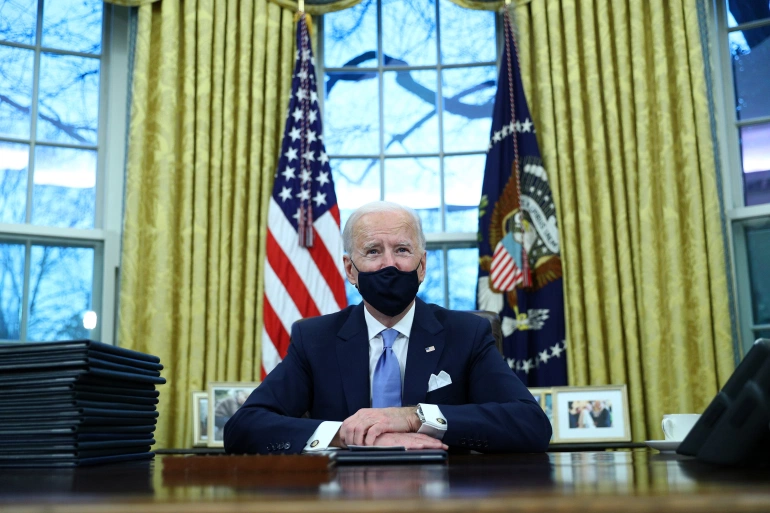
Joe Biden’s presidential bid has often invited comparisons to President Warren G Harding, whose 1920 campaign slogan promised a “return to normalcy” after a chaotic preceding decade.
But these comparisons often miss a number of important differences between the two candidates: while Harding ran on a kind of small-c conservatism, promising to rescue the country from the autocratic wartime progressivism of the Woodrow Wilson presidency, Biden campaigned on restoration of Obama-era technocracy, returning the reins of power to the United States’ elite, over-credentialed handlers after four years of populist chaos. Harding ran against the elite consensus, opposing the growing power of progressive academics in the executive bureaucracy, while Biden – in spite of his obligatory nods to fighting corporate greed, dismantling systemic racism, and speaking truth to power – ultimately ran as the champion of the pre-2016 status quo.
The “normalcy” that Biden is preparing to return the US to, then, is very different from the “normalcy” promised by his predecessor. In many ways, the septuagenarian Democrat is a personification of the destructive Clinton-Bush-Obama consensus that bears a significant responsibility for producing Donald Trump.
But it is difficult to blame voters for being wooed by this restorationist message nonetheless, especially after the tumult of the past few months: in a choice between the reckless and often downright shameful nature of Trump’s behaviour – which culminated in the January 6 riot at the US Capitol that took the lives of at least five people – and what felt, at least on the surface, like some semblance of sanity and competence, it is entirely understandable that many Americans chose the latter.
Trump’s tenure in the executive branch has undoubtedly inflamed and exacerbated the significant challenges that the US currently faces. But Biden and his counterparts do not seem to have bothered to consider why the erstwhile president’s populist energy has proved so potent. And for that reason, the incoming administration’s business-as-usual approach to governance is inevitably going to further energise the forces that swept Trump into power in the years to come.
The US’s political and cultural leaders seem to have learned very little from the last four years: the reaction to Trump from the legacy media, academia, big business, and – to varying degrees – both party establishments has not been one of introspection and critical self-reflection, but of a doubling down; “more of the same”, but with a renewed vigour and determination.
America’s political and cultural leaders seem to have learned very little from the last four years.
If President Biden truly wants to “unify” the country in the way that he says he does, he will need to reckon with the failures of the bipartisan political and cultural consensus that has governed our politics since at least September 11 attacks. For the past 20 years, our leaders have fiddled while their constituents suffered from declining life expectancies – an unprecedented trend in a modern industrialised nation – cultural atomisation, a collapsing middle class, spiritual alienation, the loss of a shared sense of citizenship and diminishing trust in every big institution in American life (with the notable exception of the military).
No single ideology has a monopoly on this issue: the disconnect between the upper one-third and the rest of the US population has grown wider under both Republican and Democratic administrations, and both Trump and Bernie Sanders tapped into comparable kinds of populist energy in segments of their respective parties. But when Sanders dropped out after his unsuccessful bid for the Democratic nomination in 2016, Trump was the only candidate who offered a meaningful alternative vision to the stale, establishment form of politics symbolised by Hillary Clinton. In retrospect, then, it should be unsurprising that he was ultimately victorious.
The populist energy that Trump represents is, at its heart, a rejection of our leaders’ seeming comfort with the deterioration of the American way of life. Economic issues are a factor in this, but they are not as central to Trump’s appeal as they are often made out to be. Fundamentally, the movement that the former reality television star harnessed is a reaction to the loss of a shared American identity, the breakdown of a sense of collective purpose, and the decline of our civic community ties. And these phenomena, in turn, are the direct result of policy decisions made by the stewards of the US’s managed decline: a corporate-friendly neoliberal economic philosophy has seen the financialisation of the American economy, the disappearance of the middle class and the hollowing out of local communities, and our elites’ embrace of multiculturalism has produced uncontrolled immigration at the border and an approach to social policy that divides Americans into distinct identity groups and pits them against one another in perpetuity.
Everywhere, now, we see the consequences of these decisions. Most recently, and disturbingly, the rise of political street violence on the fringes of both the left and the right – what Abraham Lincoln famously described as the “mobocratic spirit” in the years leading up to the Civil War – can only be understood as the direct result of the loss of faith in the American system that has been caused by these political and cultural developments.
Insofar as our elite institutions have acknowledged the Trump phenomenon as a symbol of the profound unhappiness of a significant portion of the American electorate, their response has been to denigrate, marginalise and ultimately suppress those sentiments rather than reckon with their own roles in creating them. The most recent last-ditch effort to combat the country’s increasingly radicalised populist fervour through revoking book deals, barring access to economic capital and banning accounts from social media is like attempting to heal a bullet wound with a Band-Aid. It is too little, too late – and it testifies to the persistence of a widespread elite attitude which regards Americans’ concerns about the nation’s decline as dangerously bigoted and worthy of derision.
Trump is a Jacksonian populist in full: he represents the energetic, unpredictable and sometimes dangerously unhinged id of the US’s wildest democratic passions. The aesthetic of stability offered by a Biden presidency will come as a momentary relief from those chaotic tendencies. But this is a cosmetic remedy; it will not stop the larger trends that produced Trump in the first place. In the event that our leadership class allows itself to be lulled back into a comfortable apathy by the illusion of security, something far more dangerous and destructive will emerge in Trump’s place – and when that happens, a “return to normalcy” will no longer be an option at all.

Nate Hochman is an Associate Contributor for Young Voices and a senior at Colorado College.




 World Opinions Débats De Société, Questions, Opinions et Tribunes.. La Voix Des Sans-Voix | Alternative Média
World Opinions Débats De Société, Questions, Opinions et Tribunes.. La Voix Des Sans-Voix | Alternative Média




